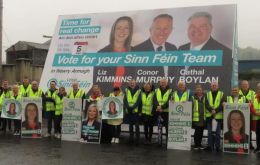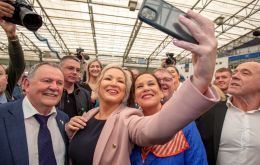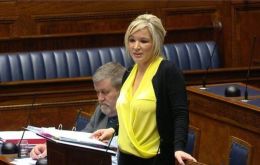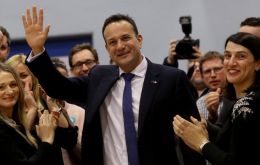MercoPress. South Atlantic News Agency
Tag: Sinn Féin
-
Tuesday, May 23rd 2023 - 07:23 UTC
Sinn Fein which calls for a united Ireland, becomes largest party in Northern Ireland

The Irish nationalist party, Sinn Fein, has become the largest party in Northern Ireland in Sunday's local election results. But rather than break a political deadlock in the North, Sinn Fein’s striking gains may harden the sectarian divide that has long complicated its fragile government.
-
Saturday, May 14th 2022 - 19:51 UTC
The delicate political situation in Ireland: Good Friday agreement hangs on a thread

By Gwynne Dyer – Four months ago, Jonathan Powell warned that the Good Friday agreement of 1998 that ended 30 years of killing in Northern Ireland was at risk.
-
Monday, May 9th 2022 - 09:58 UTC
Pro Ireland unity Sinn Fein wants to form a government this week; UK, US, Ireland call for caution

Sinn Fein, the Irish nationalist party that wants Northern Ireland out of British rule to create a united Ireland, has won for the first time the largest number of seats in the Belfast legislature, (27 out of 90) and announced that on Monday will be going to Stormont seat of the region's assembly to form a government. Meantime the governments of UK, US and Ireland have called on all parties to agree on a new administration.
-
Friday, February 4th 2022 - 09:27 UTC
Brexit trade protocol leads to Northern Ireland First Minister resignation

Northern Ireland's First Minister Paul Givan Thursday handed in his resignation citing discrepancies regarding Brexit protocols. As a consequence of his decision, Sinn Féin’s Michelle O’Neill also leaves her position as Deputy First Minister, due to the existing power-sharing arrangements dating back to 1998.
-
Friday, February 21st 2020 - 08:30 UTC
Ireland unable to form government: resigned PM, is acting as interim leader

Irish Prime Minister Leo Varadkar resigned on Thursday but stayed on as interim leader while the country's three main parties battle out coalition talks after an inconclusive election.
-
Monday, February 10th 2020 - 08:34 UTC
Ex political wing of IRA shocks Irish elections and political system

Left-wing Irish nationalist party Sinn Fein on Sunday demanded to be part of the next Irish government after tallies indicated it secured the most votes in an election that leader Mary Lou McDonald described as a ballot box “revolution”.
-
Tuesday, January 15th 2019 - 09:19 UTC
Ireland's Sinn Féin attends Maduro's inauguration and praises Venezuelan election

A Sinn Féin MLA has defended his attendance at the inauguration of the Venezuelan president and denied that the election was fraudulent. Nicolas Maduro was sworn in for a second term as Venezuela's president last Thursday.
